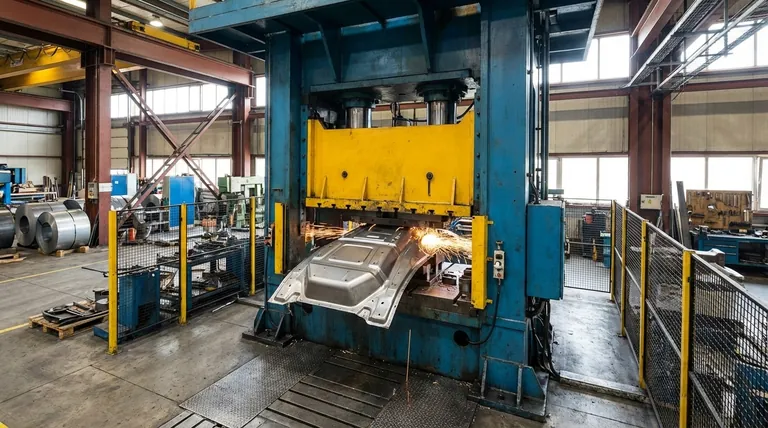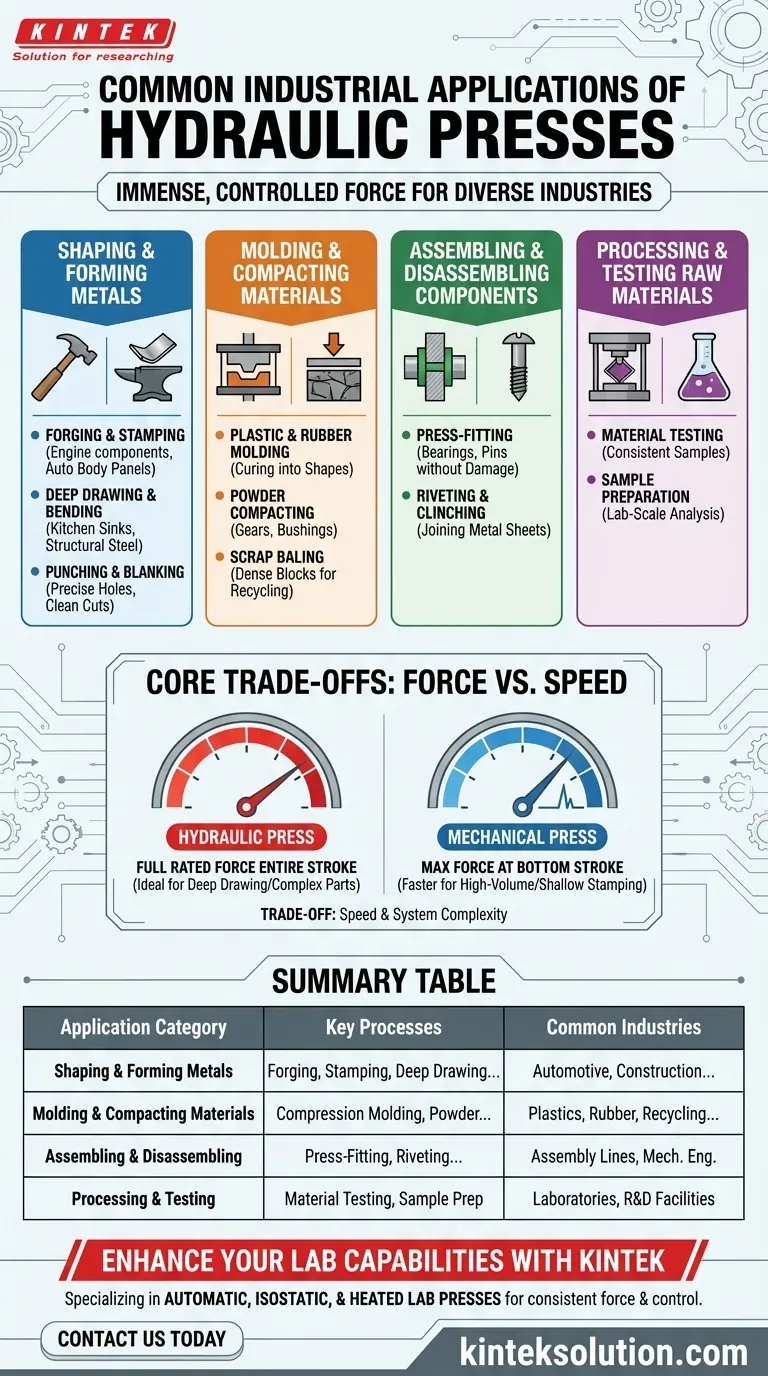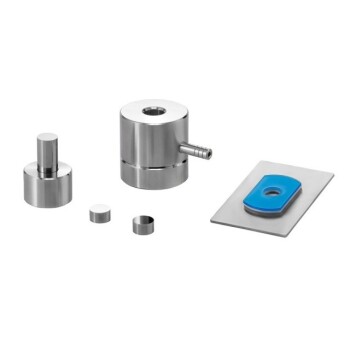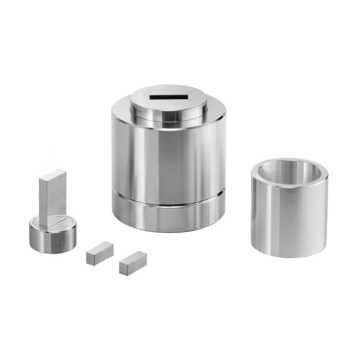At their core, hydraulic presses are used across industries for any task requiring the application of immense, controlled force. Their most common applications fall into four main categories: shaping and forming metals, molding materials like plastics and composites, assembling or disassembling components, and processing or testing raw materials.
The true value of a hydraulic press isn't just its power, but its ability to deliver that power consistently and controllably over the entire stroke. This makes it uniquely suitable for operations where uniform pressure and precision are just as critical as raw force.

Shaping and Forming Metals
One of the most extensive uses for hydraulic presses is in metalworking. The machine's ability to apply sustained, even pressure is ideal for deforming metal into precise shapes without fracturing it.
Forging and Stamping
Forging uses compressive force to shape metal, often at high temperatures. Hydraulic presses are used for open-die and closed-die forging to create strong, durable parts like engine components and tools.
Stamping or pressing uses a die to form flat metal sheets into three-dimensional shapes. This is fundamental to the automotive industry for creating body panels, doors, and structural frames.
Deep Drawing and Bending
Deep drawing is a process where a sheet metal blank is drawn into a forming die by a punch, creating deep, cup-like shapes. Kitchen sinks and cookware are common examples.
Bending is a simpler forming operation used to create angles in metal sheets or beams. Hydraulic press brakes are essential in construction and fabrication for shaping structural steel.
Punching and Blanking
Punching creates holes in a workpiece, while blanking cuts a desired shape out of a larger sheet of material. The controlled force of a hydraulic press ensures clean cuts and minimal material deformation around the edge.
Molding and Compacting Materials
Beyond metals, hydraulic presses are essential for shaping a wide range of other materials by compressing them into a mold.
Plastic and Rubber Molding
Compression molding is a primary application where pre-heated plastic, rubber, or composite material is placed in an open mold. The press closes the mold and applies heat and pressure until the material cures into the desired shape.
Powder Compacting
Hydraulic presses are used to compact metallic or ceramic powders into a specific form, known as a green compact. This is the first step in the powder metallurgy process used to make gears, bushings, and various complex parts.
Scrap Baling
In recycling, massive hydraulic presses are used for scrap baling. They compress scrap metal, cars, and other materials into dense, manageable blocks for easier transport and melting.
Assembling and Disassembling Components
The precise control of a hydraulic press makes it an invaluable tool for assembly operations that rely on interference fits.
Press-Fitting
This process involves pressing a part, such as a bearing or a pin, into a slightly smaller hole. The hydraulic press provides the steady, overwhelming force needed to complete the fit without damaging the components.
Riveting and Clinching
While other tools exist, hydraulic presses can be used for riveting and clinching, which are processes for joining sheets of metal together. The press provides the force to deform the rivet or the metal itself to create a permanent mechanical lock.
Understanding the Core Trade-offs
While incredibly versatile, hydraulic presses are not the universal solution for every application. Understanding their primary trade-off is key to using them effectively.
Force vs. Speed
The main trade-off for a hydraulic press is speed. Because they rely on moving fluid to build pressure, their cycle times are generally slower than purely mechanical presses.
Mechanical presses, which use a flywheel and crank, are often faster and better suited for high-volume, repetitive tasks like simple stamping or blanking. However, they only deliver maximum force at the very bottom of their stroke.
A hydraulic press delivers its full, rated force at any point in the stroke. This makes it superior for deep drawing or forming complex parts where sustained pressure is needed throughout the entire operation.
System Complexity
Hydraulic systems involve pumps, valves, cylinders, and fluid that require regular maintenance. Leaks, fluid contamination, or component wear can lead to downtime, which is less of a concern with simpler mechanical designs.
Making the Right Choice for Your Goal
Selecting the right process depends entirely on the desired outcome, balancing the need for force, precision, and production speed.
- If your primary focus is creating complex or deep metal parts: A hydraulic press is ideal due to its ability to apply full, sustained force throughout the entire stroke.
- If your primary focus is high-volume, shallow stamping: A mechanical press may offer a faster cycle time, making it more economical for mass production.
- If your primary focus is precision assembly: The exceptional force control of a hydraulic press is necessary for tasks like press-fitting bearings without causing damage.
- If your primary focus is lab-scale material testing or sample prep: A small, specialized hydraulic press provides the perfect combination of force and control for creating consistent samples for analysis.
Ultimately, the hydraulic press remains a cornerstone of modern industry because it provides a powerful and adaptable solution for shaping our world.
Summary Table:
| Application Category | Key Processes | Common Industries |
|---|---|---|
| Shaping and Forming Metals | Forging, Stamping, Deep Drawing, Bending, Punching, Blanking | Automotive, Construction, Manufacturing |
| Molding and Compacting Materials | Compression Molding, Powder Compacting, Scrap Baling | Plastics, Rubber, Recycling, Powder Metallurgy |
| Assembling and Disassembling Components | Press-Fitting, Riveting, Clinching | Assembly Lines, Mechanical Engineering |
| Processing and Testing | Material Testing, Sample Preparation | Laboratories, R&D Facilities |
Ready to enhance your lab's capabilities with reliable hydraulic presses? KINTEK specializes in lab press machines, including automatic lab presses, isostatic presses, and heated lab presses, designed to meet the precise needs of laboratories. Our equipment delivers consistent force and control for tasks like material testing, sample prep, and molding, ensuring accuracy and efficiency in your operations. Contact us today to discuss how our solutions can support your specific applications and drive your success!
Visual Guide

Related Products
- Laboratory Hydraulic Press 2T Lab Pellet Press for KBR FTIR
- Automatic Laboratory Hydraulic Press Lab Pellet Press Machine
- Laboratory Hydraulic Press Lab Pellet Press Button Battery Press
- Manual Laboratory Hydraulic Press Lab Pellet Press
- Manual Heated Hydraulic Lab Press with Integrated Hot Plates Hydraulic Press Machine
People Also Ask
- How is a laboratory hydraulic press used for polymer melt crystallization? Achieve Flawless Sample Standardization
- What are some laboratory applications of hydraulic presses? Boost Precision in Sample Prep and Testing
- What role does a laboratory hydraulic press play in carbonate powder prep? Optimize Your Sample Analysis
- How is a laboratory hydraulic press used for Tb(III)-Organic Framework FT-IR samples? Expert Pellet Pressing Guide
- What is the role of a hydraulic press in KBr pellet preparation for FTIR? Achieve High-Resolution Chemical Insights



















